Keto Diet and Erectile Dysfunction: Link, Effects and Benefits on Sexual health
Written by Dr. Deepali Anand

Dr. Deepali is a medical writer and healthcare professional with a background in clinical surgery and patient care. Having transitioned from active clinical practice to medical communications, she specializes in bridging the gap between complex clinical data and patient education. Dr. Deepali is dedicated to creating evidence-based content that is grounded in scientific rigor and empathy, ensuring that sensitive topics like sexual wellness and mental health are accessible and empowering for every reader.
•
September 30, 2025
Our experts continually monitor the health and wellness space, and we update our articles when new information becomes available.
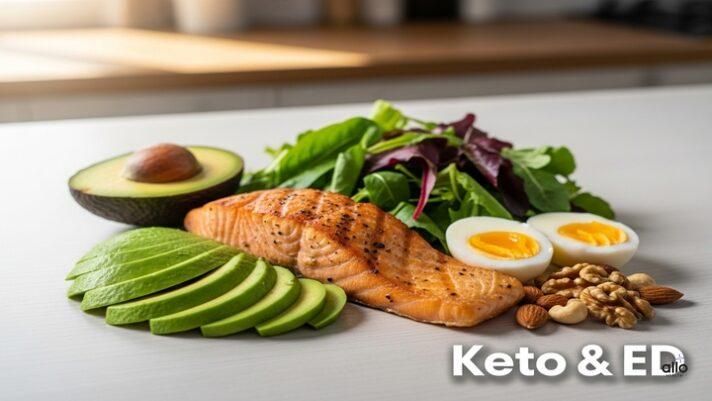
Quick Read
The keto diet may help some men with erectile dysfunction by addressing underlying causes like obesity, high blood pressure, diabetes, and low testosterone through weight loss and improved metabolic health. However, research is mixed and limited, while some studies show benefits like increased testosterone and better erectile function scores after three months, others warn that very low-carb diets might impair blood vessel relaxation and vascular health. Potential risks include initial drops in libido during the adjustment period, nutrient deficiencies, and concerns about long-term heart health from high saturated fat intake. If you're considering keto for ED, consult a doctor and opt for a moderate low-carb approach (25-30% carbs) rather than extreme restriction, and remember that diet alone isn't a cure, but works best alongside exercise, stress management, and proper medical care.
Can keto diet help with erectile dysfunction? Yes, it can help some men, but it’s not a cure. A ketogenic diet may improve underlying issues linked to ED- like obesity, high blood pressure, poor blood sugar control, and even low testosterone levels. By tackling these root causes, keto might indirectly support better erections.
But it’s not the same for everyone. Some men experience benefits while others may face challenges like nutrient deficiencies, reduced sex drive or long-term vascular risks.
In this article, we’ll explore how the keto diet and erectile dysfunction are connected, what the science says about its benefits and risks, how keto compares with other diets like Mediterranean and DASH, and practical tips to follow if you’re considering it.

Can Keto Diet Help with Erectile Dysfunction?
Yes, research[1] suggests that the ketogenic diet can, in fact, help with erectile dysfunction, especially when ED is linked to metabolic conditions such as obesity, type 2 diabetes, or high blood pressure. But the keyword here is “help” and not “cure.”
The keto diet helps with erectile dysfunction in multiple ways. It helps manage weight, blood pressure, type 2 diabetes, and, according to some sources, even helps boost testosterone levels.
However, the effect is not the same for everyone. Erectile dysfunction is a complex condition, and results can vary depending on individual health issues, personal factors, and how consistently and safely someone follows the keto diet.
According to Allo Health, nearly 1 in 2 men experience erectile dysfunction, which is based on our internal clinical data of more than 2.5 lakh patients who have visited our clinics.
It’s also important to note that while some studies highlight positive outcomes, other research has raised concerns about the potential negative effects of keto and erectile dysfunction in certain cases.
Let's dive deeper.
Allo asks
Do you believe diet can affect erectile dysfunction (ED)?
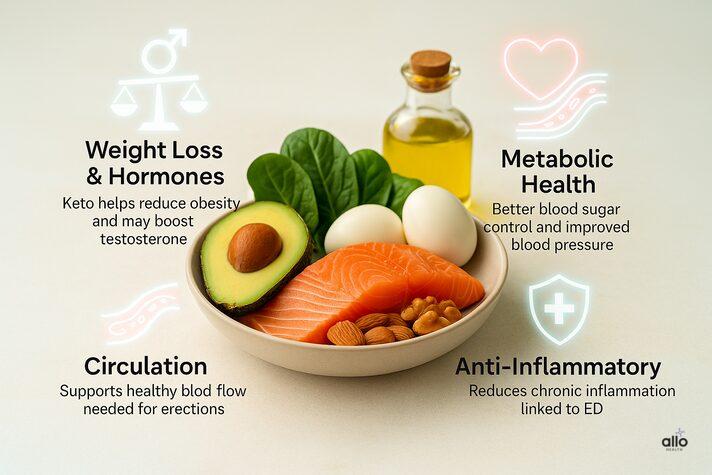
How Can Keto Diet Indirectly Help with Erectile Dysfunction
1. Weight Loss and Hormonal Balance
Research[2] indicates that following a ketogenic diet can increase testosterone levels within about 11 weeks (in some cases, by up to 118 nanograms). This happens through a few key pathways:
- The healthy fats in a keto diet provide cholesterol, which serves as a building block for testosterone production.
- Studies[3] show that improved sleep cycles and reduced stress, often linked with keto, also support natural testosterone production.
- Obesity is a major risk factor for ED and is closely linked with low testosterone levels. A low-calorie ketogenic diet helps men, especially those with metabolic disorders, manage weight and reduce abdominal fat - both of which support hormonal balance and erectile health.
2. Metabolic Health Improvement
ED is often associated with conditions like metabolic disorders, diabetes, and cardiovascular problems. The keto diet and erectile dysfunction link is partly explained by keto’s ability to improve these underlying risk factors.
Blood Sugar Control:
By improving insulin sensitivity, the keto diet can help regulate blood sugar levels, which is particularly beneficial for men with diabetes-related ED.
Improving Heart Health:
Keto may improve blood pressure and cholesterol (lipid profile), helping prevent ED linked to hypertension or ED linked with high cholesterol.
Staples of keto, like omega-3 fatty acids from fish and nuts, are excellent for cardiovascular health. Strong circulation is essential for erections since blood flow to the penis determines erectile function.
Weight Management
In addition to blood sugar and blood pressure regulation, keto reduces abdominal fat, another known marker for ED risk.
3. Improved Blood Circulation
Good erections depend on good circulation, and the keto diet may play a role here as well:
- Some research[4] suggests keto may increase nitric oxide production. This nitric oxide is crucial for erections because it allows blood vessels to dilate and improves penile blood flow.
- Keto also appears to have antioxidant properties[5]. These protect blood vessels and preserve endothelial function, both of which are necessary for healthy circulation throughout the body, including in the penis.
4. Anti-Inflammatory Effect
The keto diet is also anti-inflammatory. This property of the diet helps to address chronic inflammation linked with metabolic disorders, which causes erectile dysfunction.
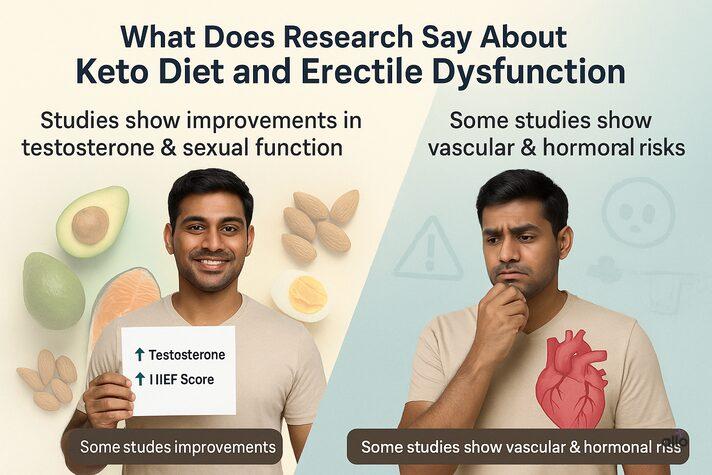
What Does Research Say About Keto Diet and Erectile Dysfunction
Research Supporting Keto Diet and Erectile Dysfunction
Some studies[6] show that the keto diet may improve sexual health:
- In men with low testosterone, a 3-month ketogenic diet increased both free and serum testosterone levels.
- The same study found higher IIEF scores (a standard measure of erectile dysfunction).
- Another study noted improvements in overall sexual function, including less pain during ejaculation.
These results suggest that the keto diet and erectile dysfunction may be connected through better hormone balance, weight control, and blood sugar management.
Research Pointing Out Risks of Keto and Erectile Dysfunction
Other research points to possible downsides:
- Very low-carb diets can reduce relaxation of penile smooth muscles, limiting blood flow needed for erections.[7]
- A comparative study found that while both low-fat and low-carb diets led to weight loss, only the low-fat diet improved vascular health.[8]
- Long-term keto may lower leptin, a hormone that helps regulate sex hormones, which could affect erectile function.[9]
Conclusion from These Studies
The research on keto and erectile dysfunction benefits is mixed and very limited to come to any solid conclusion on whether can keto diet help with erectile dysfunction.
The keto diet can support your overall health in ways that may improve erections, but it’s not a magic fix. Think of it as one piece of the puzzle, alongside exercise, stress management, and medical care.
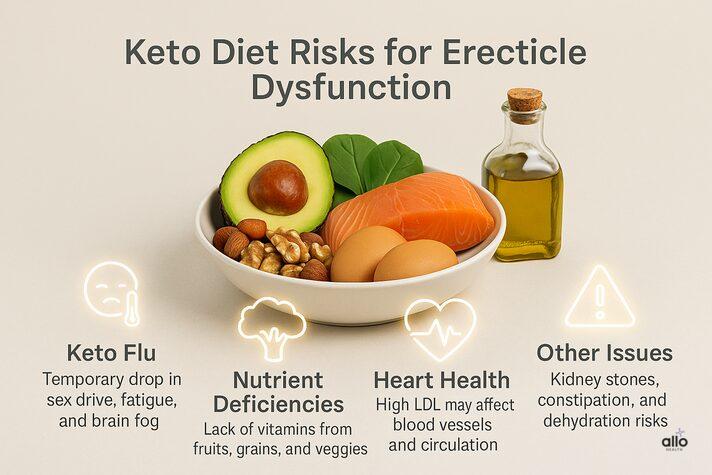
Keto Diet and Erectile Dysfunction: Risks & Potential Downsides
Long-term ketogenic diets can carry several side effects that may indirectly impact sexual health and sex drive.
1. Keto Flu
When people first start the keto diet, many experience what’s called the “keto flu”, a temporary set of symptoms that can feel like carbohydrate withdrawal. During this period, some men report a drop in libido and sexual performance.
Common short-term issues include:
- Temporary decrease in sex drive (lasting a few days to weeks)
- Fatigue and mood swings that affect sexual desire
- Brain fog, irritability, and low energy that impact overall wellness
The good news is that these effects usually fade once the body adjusts to the diet, typically after a few weeks.
2. Nutrient Deficiencies
The restrictive nature of the keto diet can lead to deficiencies of essential nutrients found in whole grains, fruits, and some vegetables.
3. Heart Health
A high-fat diet, especially one heavy in saturated fats, can raise LDL (“bad”) cholesterol. This may increase the risk of plaque buildup in blood vessels (atherosclerosis), which not only harms heart health but also reduces blood flow to the penis, contributing to erectile problems.
4. Other Health Issues
- Kidney stones (from higher protein intake)
- Constipation (due to low fiber content)
- Dehydration and electrolyte imbalances
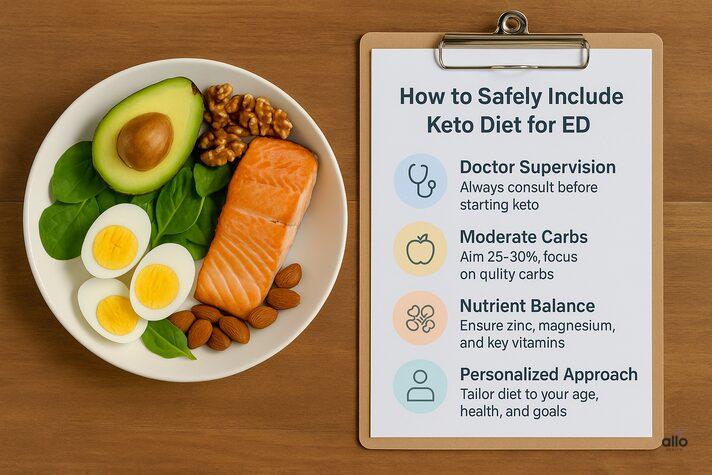
How to Safely Include Keto Diet for ED
If you’re considering the keto diet and erectile dysfunction connection, it’s important to do it safely.
1. Take Medical Supervision
Always talk to a doctor before starting the keto diet for erectile dysfunction. This is especially important for:
- Men with metabolic disorders, diabetes, or heart issues
- Those already on medications for blood pressure or blood sugar
A healthcare provider can monitor your progress, adjust medications if needed, and ensure keto won’t worsen your condition
2. Take a Moderate Low-Carb Approach
Research shows that extreme carb elimination (<5%) isn’t necessary and may even cause problems. A moderate low-carbohydrate approach can offer benefits while reducing risks.
- Aim for 25-30% carbohydrates instead of near-zero.
- Choose quality carbs: whole grains, vegetables, legumes, and low-sugar fruits.
- Prioritize healthy fats (olive oil, avocados, nuts, fatty fish) over saturated fats.
- Include foods that boost nitric oxide (leafy greens, beets, nuts) to support better blood circulation and erections.
3. Balance Nutrients
- Monitor key micronutrients like zinc and magnesium (important for testosterone and sex drive).
- Watch for deficiencies and correct them through diet or supplements under medical guidance.
4. Personalize Your Diet
The effectiveness of keto for ED isn’t the same for everyone.[10] Your baseline health and lifestyle play a big role.
- Metabolic syndrome, obesity, diabetes → These men may see the most benefit from keto.
- Age and hormones → Older men with lower testosterone levels may respond better.
- Duration → Benefits tend to emerge after 3+ months of consistent, well-supervised dieting.
Remember, what works for one person may not work for another. The goal is to find a safe, sustainable approach that fits your body.
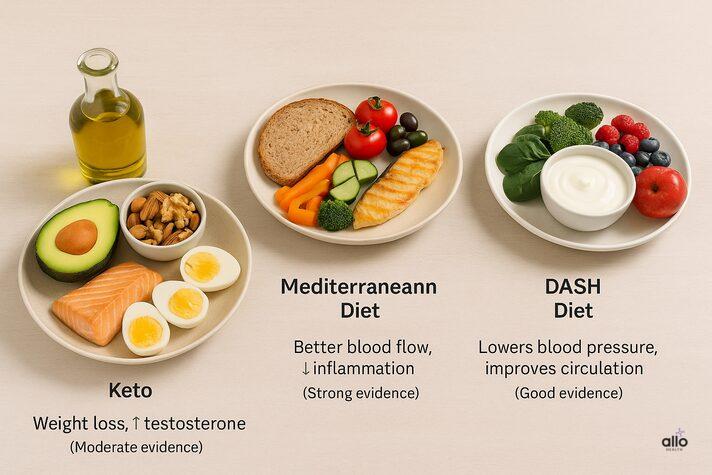
Keto vs Other Diets for Erectile Dysfunction
The keto diet and erectile dysfunction connection often gets attention, but keto isn’t the only option. Other dietary patterns, like the Mediterranean diet and the DASH diet, have strong evidence for supporting sexual and vascular health.
- Mediterranean diet: Focuses on whole grains, olive oil, vegetables, fruits, legumes, fish, and lean proteins.
- DASH diet (Dietary Approaches to Stop Hypertension): Prioritizes low salt, fruits, vegetables, whole grains, low-fat dairy, and lean protein. It was originally designed to help control blood pressure, but its benefits extend to overall vascular and sexual health.
Diet
How It Helps ED
Evidence
Note
Keto
Weight loss, ↑testosterone
Moderate
Low fiber, vascular concerns
Mediterranean
Better blood flow, ↓inflammation
Strong
Best evidence for sexual & heart health
DASH
Lowers blood pressure, improves circulation
Good
Great for hypertension
Bottom Line: Should You Try Keto for ED?
So, can keto diet help with erectile dysfunction? Yes, it can support overall health in ways that may indirectly improve erectile dysfunction. But it’s not a guaranteed cure, and results vary from person to person.
If done wisely, the keto diet may support sexual health by improving weight, hormones, and metabolic balance. For lasting results, though, it works best when combined with healthy lifestyle habits like regular exercise, stress management, and proper medical care.
The safest approach is a balanced, moderate low-carb plan under medical supervision. That way, you get the potential benefits of keto while reducing risks.
Disclaimer
The following blog article discusses food and diet-related information for general educational purposes. However, it is important to note that the information provided is not intended as personalized dietary advice and should not be considered a substitute for professional guidance from a registered dietitian or qualified healthcare professional. Before making any significant changes to your diet or nutrition plan, it is recommended to consult with a registered dietitian or healthcare professional. Dietary changes can have a significant impact on your overall health and well-being. It is important to approach any changes to your diet in a balanced and sustainable manner, ensuring that you meet your nutritional needs and avoid any potential nutrient deficiencies. Rapid or extreme changes in dietary patterns can be detrimental to your health and may require professional guidance. It is crucial to note that any specific dietary recommendations or guidelines mentioned in this article may not be appropriate for individuals with specific medical conditions, allergies, or intolerances. A registered dietitian or healthcare professional can provide individualized advice, including modifications or alternative food choices to accommodate your unique circumstances. The information provided in this article may not encompass all possible dietary considerations or account for the latest research and nutritional guidelines.
Most Asked Questions
What is the best diet for erectile dysfunction?
There isn’t one single “best” diet, but research shows the Mediterranean diet and the DASH diet have the strongest evidence for improving blood flow and supporting long-term sexual health. The keto diet may help some men, especially those with obesity or metabolic disorders, but results vary.
Does keto increase testosterone in men?
Yes, some studies suggest the ketogenic diet can raise testosterone levels in men, especially when combined with weight loss. However, the boost is not guaranteed for everyone, and it often depends on your starting health, body weight, and lifestyle.
Can keto diet really help with erectile dysfunction?
The keto diet and erectile dysfunction connection is mostly indirect. By helping with weight loss, blood sugar control, blood pressure, and sometimes hormones, keto may improve factors that cause ED. But it’s not a cure, and not everyone will see the same results.
What happens on day 3 of keto?
Around day 3, many people start to feel the effects of “keto flu”- fatigue, irritability, brain fog, or even a temporary drop in sex drive. These symptoms usually fade after a week or two once your body adapts to using fat instead of carbs for energy.
Is keto safe for men with erectile dysfunction?
Keto can be safe when done under medical supervision, but it’s not risk-free. Potential downsides include nutrient deficiencies, higher LDL cholesterol, and long-term vascular concerns. Men with diabetes, high blood pressure, or metabolic disorders should talk to their doctor before starting keto.
Sources
- 1.
The effects of a low carbohydrate diet on erectile function and serum testosterone levels in hypogonadal men with metabolic syndrome: a randomized clinical trial
- 2.
The effects of a low carbohydrate diet on erectile function and serum testosterone levels in hypogonadal men with metabolic syndrome: a randomized clinical trial
- 3.
The relationship between sleep disorders and testosterone in men
- 4.
Increased nitric oxide caused by the ketogenic diet reduces the onset time of kainic acid-induced seizures in ICR mice
- 5.
Ketogenic diet decreases oxidative stress and improves mitochondrial respiratory complex activity
- 6.
Ketogenic state improves testosterone serum levels-results from a systematic review and meta-analysis
- 7.
Evaluating the Effects of Low Carbohydrate and High Protein Diet on Erectile Function in Rats
- 8.
Carbohydrates and Endothelial Function: Is a Low-Carbohydrate Diet or a Low-Glycemic Index Diet Favourable for Vascular Health?
- 9.
Long-Term Effects of a Classic Ketogenic Diet on Ghrelin and Leptin Concentration: A 12-Month Prospective Study in a Cohort of Italian Children and Adults with GLUT1-Deficiency Syndrome and Drug Resistant Epilepsy
- 10.
Ketogenic state improves testosterone serum levels-results from a systematic review and meta-analysis


